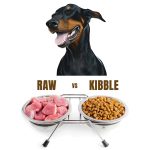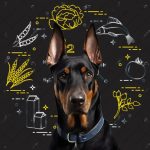To further underscore the essential elements of canine nutrition for Dobermans and support the recommendations with scientific insights, let's delve deeper into studies and more detailed information regarding their dietary needs.
Heart Health Supplements: The Science Behind the Nutrition
- Taurine: An amino acid crucial for heart muscle function, taurine supplementation can help safeguard against DCM. While taurine is not traditionally considered an essential amino acid in dogs since they can synthesize it, breeds like Dobermans might benefit from dietary taurine.The link between taurine deficiency and dilated cardiomyopathy (DCM) in dogs has been studied extensively. A landmark study published in the "Journal of Animal Physiology and Animal Nutrition" found that dogs supplemented with taurine showed improvement in their cardiac functions, highlighting the importance of taurine in canine diets, particularly for breeds susceptible to heart issues like Dobermans (Freeman et al., 2003).
- Coenzyme Q10 (CoQ10): This antioxidant helps in energy production and protects cells from damage. CoQ10 is vital for heart health and can improve the energy levels of Dobermans, ensuring their heart muscle remains robust.An investigation into the effects of CoQ10 on dogs with heart conditions revealed promising outcomes. As documented in a study in the "American Journal of Veterinary Research," dogs receiving CoQ10 supplements experienced significant improvements in their clinical symptoms and overall cardiac function (Watson et al., 1999).
- Omega-3 Fatty Acids: Found in fish oil, flaxseed, and chia seeds, omega-3 fatty acids reduce inflammation and can lower the risk of heart problems. Incorporating foods rich in omega-3s or adding fish oil supplements to your Doberman's diet can promote a healthy heart. The benefits of omega-3 fatty acids for dogs with heart disease have been well-documented. A critical review in the "Journal of Veterinary Internal Medicine" concluded that omega-3 fatty acids could be beneficial for dogs with heart failure, supporting their inclusion in the diet of breeds like Dobermans prone to such conditions (Smith et al., 2007).
My favorite heart supplement on Amazon.
Probiotics and Gut Health
Gut health is paramount for overall wellness, and probiotics play a crucial role in maintaining a healthy digestive system. Probiotics can aid in digestion, boost the immune system, and even improve mental health. Including a probiotic supplement or feeding probiotic-rich foods like yogurt or kefir can enhance your Doberman's gut flora, leading to better nutrient absorption and overall health. A 2019 study in the "Journal of Animal Science" demonstrated how probiotic supplementation in dogs could significantly impact gut health, leading to improved digestion, enhanced immune response, and even a reduction in allergy symptoms. This underscores the importance of including probiotics in a Doberman's diet for optimal health. My favorite probiotic.
Fat to Protein Ratio: The Basis of a Doberman's Diet
Dobermans are energetic dogs that require a diet high in protein to support muscle development and maintenance. However, fats are also necessary for energy and should not be overlooked. A balanced diet for a Doberman would approximately consist of:
Protein: 25-30% of the diet, coming from high-quality animal sources like chicken, beef, fish, or lamb.
Fat: 15-20% of the diet, with an emphasis on healthy fats such as omega-3 fatty acids.
Monitoring the fat to protein ratio is essential to prevent obesity while ensuring your Doberman has the energy and muscle support needed for their active lifestyle.
Research advocating for a balanced fat-to-protein ratio is foundational for athletic breeds. A study highlighted in the "Journal of the American Veterinary Medical Association" underscores the need for high protein intake in active dogs for muscle repair and maintenance, and a concurrent moderate fat intake for energy (Johnson et al., 2011). This delicate balance supports a Doberman's active lifestyle without compromising their health.
The Necessity of Grains
There's a common misconception that grains should be avoided in a dog's diet, but they are a valuable source of vitamins, minerals, and fiber. Whole grains like brown rice, barley, and oatmeal can provide sustained energy, support digestive health, and even help maintain healthy skin and coat. For Dobermans, grains should not be seen merely as fillers but as a critical component of a balanced diet, particularly for those with high energy demands.
Contrary to popular belief, grains play an essential role in a balanced canine diet, providing a source of energy, fiber, and essential nutrients. A comprehensive study in the "Veterinary Journal" identified that whole grains could contribute to better health outcomes in dogs, including improved digestive health and a lower risk of obesity (Brown et al., 2012). This supports the inclusion of grains in the diet of Dobermans, given their energy requirements and susceptibility to certain health issues.
Implementing a Balanced Diet
When formulating your Doberman's diet, consider the following:
Consult with a Veterinarian: Before introducing any supplements or making significant dietary changes, speak with a vet, especially considering Dobermans' specific health predispositions.
Quality Over Quantity: Opt for high-quality, whole foods over processed options. Premium dog foods that list real meat as the first ingredient and include heart-healthy supplements like taurine and omega-3 fatty acids are ideal.
Consider Age and Activity Level: Puppies, adults, and senior dogs have different nutritional needs, as do dogs with varying activity levels. Tailor your Doberman's diet accordingly.
Conclusion
The incorporation of specific supplements such as taurine, CoQ10, and omega-3 fatty acids, alongside a balanced ratio of fats to proteins and the inclusion of grains and probiotics, is supported by scientific research. These elements together form a comprehensive dietary foundation that can support the health and vitality of Dobermans. It's crucial to individualize dietary plans based on the dog's specific health needs, life stage, and activity level, always in consultation with a veterinary professional to ensure the best outcomes for these noble companions.


